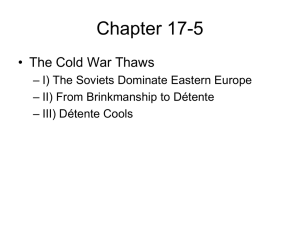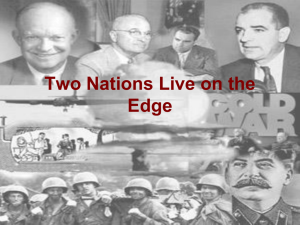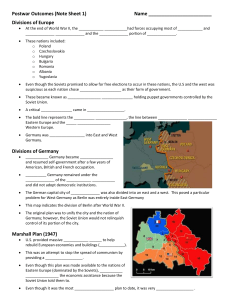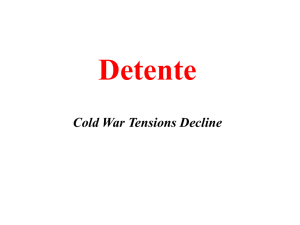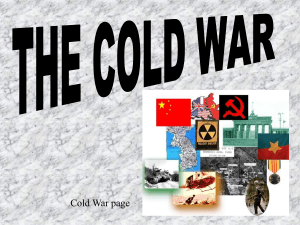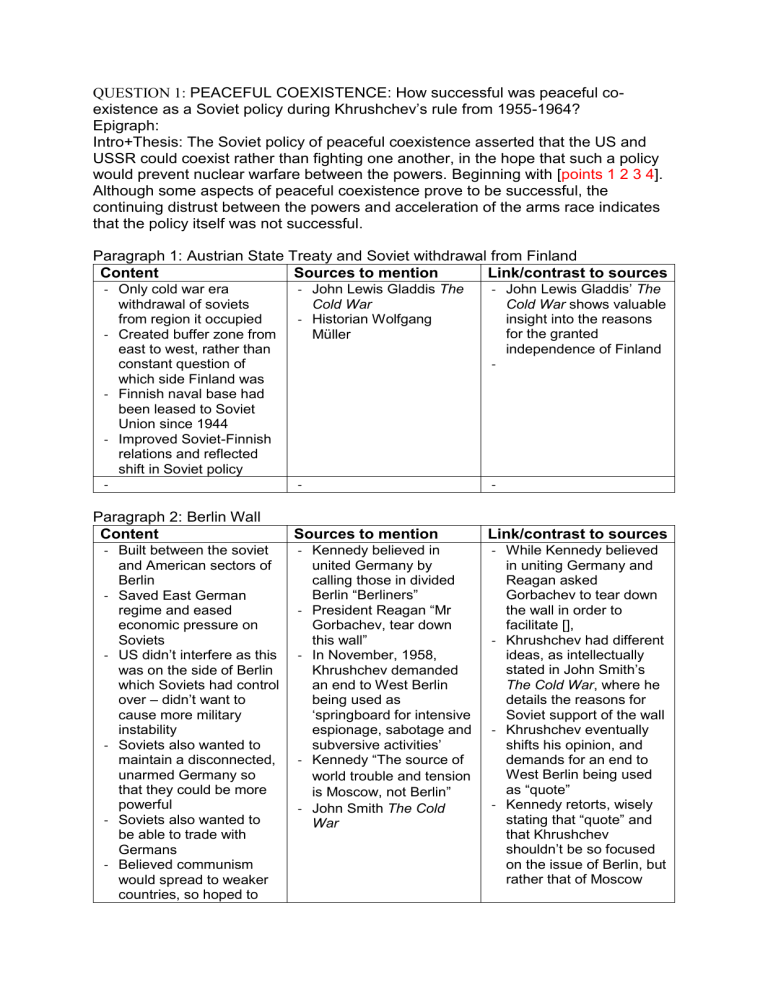
QUESTION 1: PEACEFUL COEXISTENCE: How successful was peaceful coexistence as a Soviet policy during Khrushchev’s rule from 1955-1964? Epigraph: Intro+Thesis: The Soviet policy of peaceful coexistence asserted that the US and USSR could coexist rather than fighting one another, in the hope that such a policy would prevent nuclear warfare between the powers. Beginning with [points 1 2 3 4]. Although some aspects of peaceful coexistence prove to be successful, the continuing distrust between the powers and acceleration of the arms race indicates that the policy itself was not successful. Paragraph 1: Austrian State Treaty and Soviet withdrawal from Finland Content Sources to mention Link/contrast to sources - Only cold war era withdrawal of soviets from region it occupied - Created buffer zone from east to west, rather than constant question of which side Finland was - Finnish naval base had been leased to Soviet Union since 1944 - Improved Soviet-Finnish relations and reflected shift in Soviet policy - Paragraph 2: Berlin Wall Content - Built between the soviet and American sectors of Berlin - Saved East German regime and eased economic pressure on Soviets - US didn’t interfere as this was on the side of Berlin which Soviets had control over – didn’t want to cause more military instability - Soviets also wanted to maintain a disconnected, unarmed Germany so that they could be more powerful - Soviets also wanted to be able to trade with Germans - Believed communism would spread to weaker countries, so hoped to - John Lewis Gladdis The Cold War - Historian Wolfgang Müller - John Lewis Gladdis’ The Cold War shows valuable insight into the reasons for the granted independence of Finland - - - Sources to mention Link/contrast to sources - Kennedy believed in united Germany by calling those in divided Berlin “Berliners” - President Reagan “Mr Gorbachev, tear down this wall” - In November, 1958, Khrushchev demanded an end to West Berlin being used as ‘springboard for intensive espionage, sabotage and subversive activities’ - Kennedy “The source of world trouble and tension is Moscow, not Berlin” - John Smith The Cold War - While Kennedy believed in uniting Germany and Reagan asked Gorbachev to tear down the wall in order to facilitate [], - Khrushchev had different ideas, as intellectually stated in John Smith’s The Cold War, where he details the reasons for Soviet support of the wall - Khrushchev eventually shifts his opinion, and demands for an end to West Berlin being used as “quote” - Kennedy retorts, wisely stating that “quote” and that Khrushchev shouldn’t be so focused on the issue of Berlin, but rather that of Moscow spread communism into Germany while they were weak - - - Paragraph 3: Soviet Missiles in Cuba Content Sources to mention - 1962 Soviet missiles - On 22 October, Kennedy discovered in Cuba - Kennedy doesn’t want to be seen as weak and so orders naval blockade of Cuba to prevent further weaponry from being sent to Cuba - Within that month, Khrushchev agrees to dismantle missile sites and order cargo ships to return - Does this in exchange for the US to remove missiles from Turkey spoke to the nation of Khrushchev’s “clandestine, reckless and provocative threat to world peace” - John Lewis Gaddis (2005) The Cold War - - Khrushchev saved communist regime in Cuba from US invasion + negotiated for US to remove Jupiter missiles from Turkey - Kennedy kept election promise and stood up to USSR to get missiles out of Cuba - Soviet missile crisis drove both leaders to avoid a similar confrontation - Crisis paved way for détente and greater communication - John Smith (1998) The Cold War (2nd ed) - Paragraph 4: Limited test ban treaty Content Sources to mention - Signed in Moscow, 1963 - Niall Ferguson - The War - Prohibited nuclear weapon tests everywhere but underground of the World Episode 5 (economic determinist historian) Link/contrast to sources - On 22 October, Kennedy openly spoke to the nation of Khrushchev’s “quote” - In comparison, Oxford historical textbooks claim that the missiles were placed there as a deterrent to the US’s missiles in Turkey - Historian John Lewis Gladdis, in his book The Cold War believes that Kennedy didn’t want to be seen as weak which is the reasoning behind the naval blockade of Cuba - Other sources also suggest it was to prevent further weaponry from being sent to Cuba - John Smith, author of The Cold War noted that the Cuban Missile Crisis ended well for all sides – [points] - Link/contrast to sources - Historian Niall Ferguson in his documentary The War of the World intelligently adds that one reason for this treaty was - Pledged signatories to work toward complete disarmament – end armament race + contamination of environment - - - that less money could be invested into weaponry and more into the economy and living standards - Conclusion: despite the positives of the prevention of nuclear war due to peaceful coexistence, the policy itself proved unsuccessful as the arms race continued to escalate and there was an extreme lack of trust behind the scenes – which is the reason why no power abandoned their back-up weapons and why nuclear weaponry continued to be developed. QUESTION 2: DÉTENTE: How successful was detente as an American strategy from 1968-1979? Epigraph: “Detente is a readiness to resolve differences and conflicts not by force, not by threats and sabre-rattling, but by peaceful means, at the conference table.” -Leonid Brezhnev, Soviet leader, 1977 Intro+Thesis: Détente was a period of improved relations and communications between the US and USSR aiming to reduce tension and possibility of nuclear warfare. The development of both the SALT 1 and SALT 2 treaties in the end proved useless, as with the Soviet invasion of Afghanistan, [point], and détente was officially declared a failure at Reagan’s election in 1981, where he changed the focus to [point]. Paragraph 1: 1969: Salt 1: limiting arms race Content Sources to mention Link/contrast to sources - US found it increasingly difficult to finance global military presence, but didn’t want to appear weak - Freeze on different missiles and bombers, as well as attempts to prevent nuclear warfare - Not only did these agreements restrict weaponry, but they facilitated discussions and relations between the powers which led to more accommodation of each others political interests and strategic necessities - Soviets mainly took part in Salt 1 agreements in order to improve relations, allowing them to benefit from agriculture - Historian Allan Todd in Cambridge The Cold War: Superpower tensions and rivalries - John Lewis Gladdis – The Cold War - - Historian Allan Todd in book details the terms of the agreement - Also provides a valuable perspective on the Soviet motivation to take part in this agreement – for own gain - Historian John Lewis Gladdis also notably argues that seeking détente was only way of ensuring stability of Soviet spheres of influence around Europe - and technological advancements - Paragraph 2: 1979: Salt 2: Content Sources to mention - More controversial as US was less happy to compromise than they did in Salt 1 - More focused on nuclear weapons in attempt to clearly move away from nuclear warfare - Difficult to negotiate terms as both sides had different military strategies, where the US focused more on accuracy of small missiles but USSR focused on larger arrow heads - Attempt to prevent the acceleration of the arms race - Also limited further experimentation of specific weaponry, again putting a cap on the arms race - Salt 1 limited military forces of each country, while Salt 2 allowed growth but not increase in speed or technological advancement - Historian Allan Todd in Cambridge The Cold War: Superpower tensions and rivalries - John Lewis Gladdis – The Cold War Paragraph 3: 1979: Soviet invasion of Afghanistan Content Sources to mention - A fight of ideology - Involved the Soviets invading Afghanistan in the hope of reestablishing the communist regime there - The US, on the other hand, wanted - Brzezinski "We didn't push the Russians to intervene, but we knowingly increased the probability that they would...That secret operation was an excellent idea. It had the Link/contrast to sources - Allan Todd focuses more on the treaty’s agreements, while Gladdis provides the perspective of motivations from certain powers, in that both sides were struggling financially but wanted to appear the dominant power – opening the possibility for such an agreement - Link/contrast to sources - Brzezinski offers a valuable perspective from just after the events, detailing the knowing “increased probability” that his country was having on the Soviets - - - - - Afghanistan to remain separate and to prevent the spread of communism US instituted a trade embargo and boycotted the Olympics in Moscow Tried their best to prevent the Soviet success, especially as it went against the treaty Since the US blocked trade, Soviets eventually left Geneva accords eventually signed for USSR to withdraw forces from Afghanistan Brzezinski also reflects on these events effect of drawing the Soviets into the Afghan trap ... The day that the Soviets officially crossed the border, I wrote to President Carter "We now have the opportunity of giving to the Soviet Union its Vietnam War." - Historian Allan Todd in The Cold War - - Historian allan todd also knowledgeably highlights the US’ response to the Soviet invasion – their blockade as a result of the want to prevent communism from spreading Paragraph 4: 1981: Reagan’s election, détente declared failure Content Sources to mention Link/contrast to sources - Reagan’s election in 1980 was based on an anti-détente campaign - His election marked the end of détente and a return to cold war tensions - Reagan was determined to increase pressure on the Soviets and intimidate them into making concessions in the Cold War. - By accelerating US production of arms, he aimed to make the Soviets fall even further behind – and was successful in doing so - - “Détente’s been a oneway street that the Soviet Union has used to pursue its aims.” - Reagan believed the Soviets only took part in Détente for their own benefit and not with the correct interests at heart – a view also shared by historians such as [] QUESTION 3: CONFRONTATION AND RECONCILIATION: reasons for the end of the Cold War (1980–1991): ideological challenges and dissent; economic problems; arms race. Epigraph: Intro+Thesis: Paragraph 1: Four Summits in Geneva Content Sources to mention Link/contrast to sources Paragraph 2: Four Summits in Reyjkavik Content Sources to mention Link/contrast to sources Paragraph 3: Four Summits in Washington Content Sources to mention Link/contrast to sources Paragraph 4: Four Summits in Moscow Content Sources to mention Link/contrast to sources -
